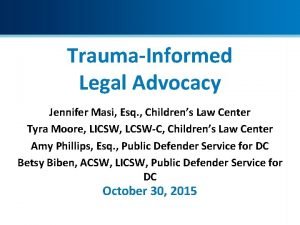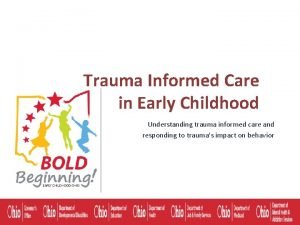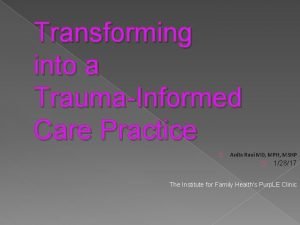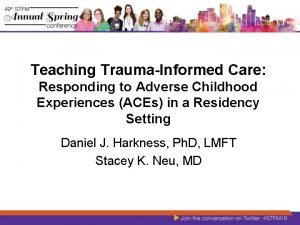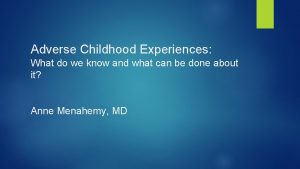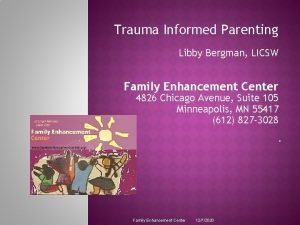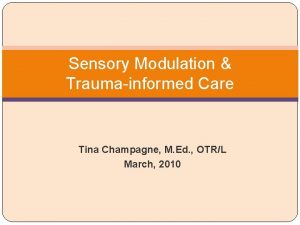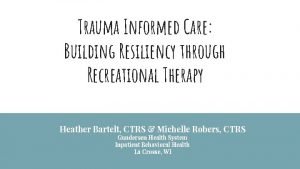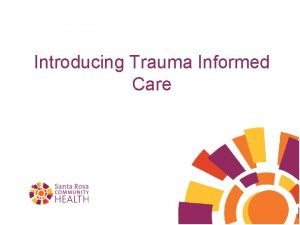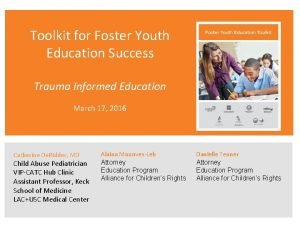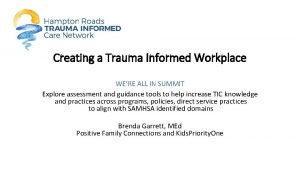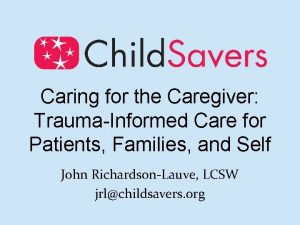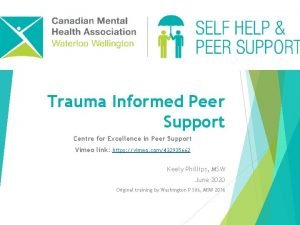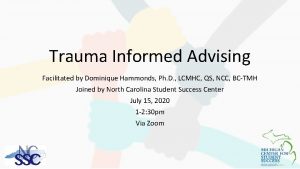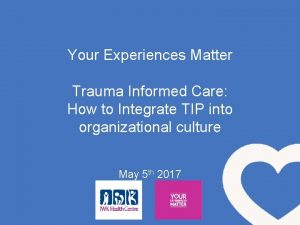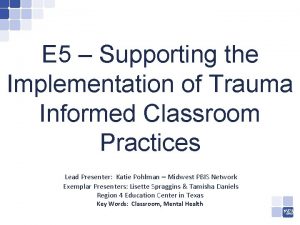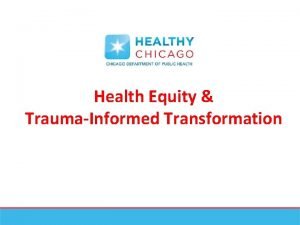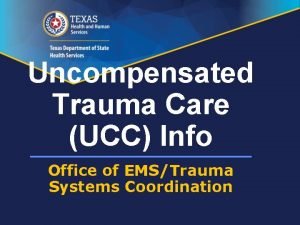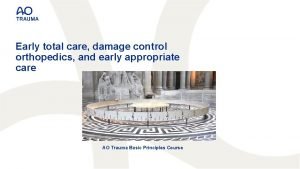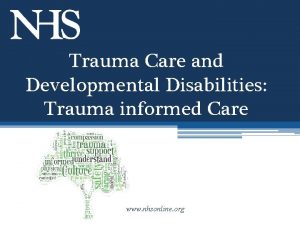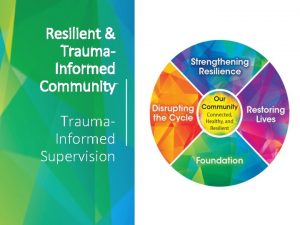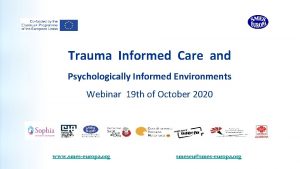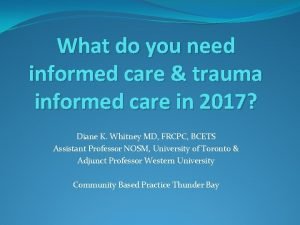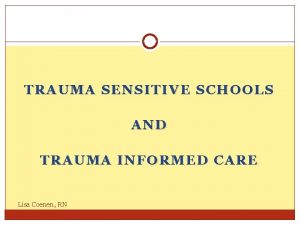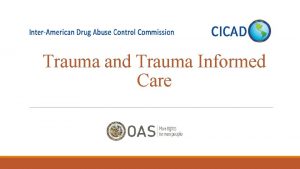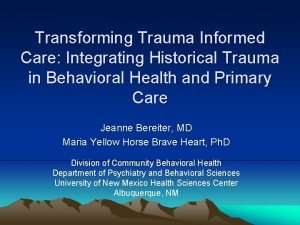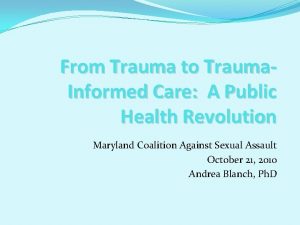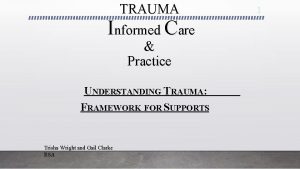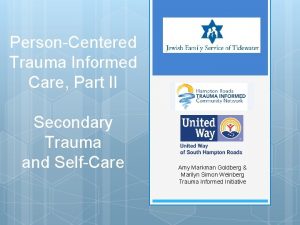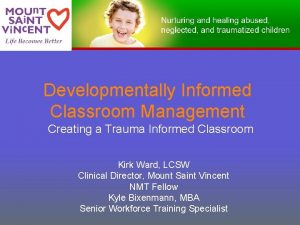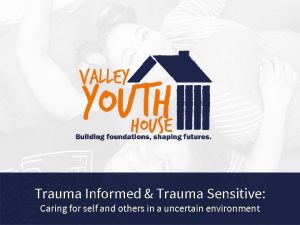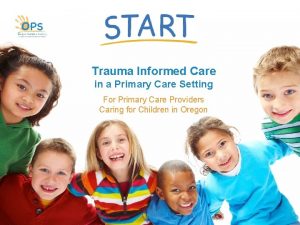Introduction to Trauma Informed Care in Legal and





















- Slides: 21

Introduction to Trauma Informed Care in Legal and Social Services CONNECTING OTTAWA With Mego Nerses & Jaime Lefebvre

CONNECTING OTTAWA Mandate: Increase access to justice for linguistic minorities and people with disabilities; i. e. those who are not proficient in English or French or who face communication challenges as the result of a disability or sensory impairment. Services: We provide case consultations which include “capacity building” and regular “Public Legal Education” workshops/ presentations -Tools: Rack Cards, Volunteer Facilitator Program etc.


VOLUNTEER FACILITATOR PROGRAM - “trusted intermediaries” who assist our clients by bridging the gap that can exist between the point of referral and the point of legal services delivery for persons who have a significant communication difficulty. - Reaching out and being matched with clients who have been referred to a legal service but who may not be able to access the service without the support of a Volunteer Facilitator. The Facilitator is an accessible and approachable resource to the client. Solve problems that may prevent the person from connecting with the legal service- navigation, transportation, explanation of the services sought…

TRAUMA INFORMED CARE An Introduction

Goals of this Session: This talk aims to provide an INTRODUCTION to Trauma Informed Care -1)what is the basic idea of this approach? FORMAT: 1) Basic Idea 2) Basic Tenets 3) Case Scenario -2)what are the basic tenets? 4) Small Group Work -3)why this useful in legal work/ social services work? 5) Resources in Ottawa -4)What are options for to obtain full training in this approach? 7) Help yourself to Materials -5)exposure to one case scenario 6) Questions

THE ALI FAMILY - Grandmother, (not pictured) - Mother, Khadra - Father, Moustafa - Son, Omar 18 yrs. - Son, Ahmed 9 yrs. - Niece, remains in Karbala - *We will be looking at Mother today

Mother – Khadra. Client comes to see you at your clinic/ centre: Khadra is 43 years old and is a talented seamstress and devoted mother a wife who is hopeful for a better life for herself and her family in Canada. Since arriving in Ottawa she had not been engaged in her new community as of yet. She shows reluctance to leave their home and will only leave when there are pressing family obligations such as picking up her young son from school and grocery shopping. In her former neighbourhood, she regularly interacted with her neighbours and had a wide circle of friends. She now has trouble sleeping. She repeatedly says to her mother that she feels like she has less energy than she did in Karbala. She misses her sister and nieces in Iraq. She has attended a language circle twice in three months even though she states that she wants to learn English. Nonetheless, Khadra remains committed to the original goal of becoming a Canadian citizen. What is your approach? What will you keep in mind?

with thanks to: ------- Dr. Azaad Kassam at akassam@qch. on. ca Queensway Carleton & Dr. Doug Gruner, MD, CCFP Department of Family Medicine TRAUMA- INFORMED APPROACH REALIZES: impact of trauma (the context) and understands that there are many ways to recover 2. RECOGNIZES: the signs and symptoms of trauma 3. RESPONDS : by integrating knowledge about trauma into practices/care and policies 4. RESISTS : pitfalls that lead to re-traumatization. 1.

RECOVERY AND RESILIENCE KEY ELEMENTS TO RECOVERY: � - survivors need to be respected, informed, connected � - be aware of the link between trauma and symptoms of trauma ( depression, anxiety, substance abuse, lifestyle choices) - the need to work with family, friends and community resources � KEY PRINCIPLES � SAFETY � TRUST � EMPOWERMENT � COLLABORATIVE � CULTURAL/HISTORICAL/GENDER ISSUES

MENTAL HEALTH � � As health care providers we need to be on the alert and highly vigilant for the early signs. However the evidence suggests that we should not be screening for PTSD, depression and other mental health concerns in otherwise asymptomatic individuals for a number of reasons. 1. Bringing this up can cause harm especially if the individual is not ready to discuss this. 2. It is crucial to ensure there adequate resources in place to deal with the issue.

WHEN TO REFER a CLIENT : Mental HEALTH COUNSELLING If integration and acculturation challenges are interfering with or even causing distress that interfere with a person’s ability to carry out their “ADLs” (activities of daily life) that is when a referral to a medical professional and/ or counsellor OR a trusted intermediary who is able to then refer an access social services and mental health and health resources for the person and their families is recommended. Please be aware/ Gentle reminder: the best practice framework is to be very “family oriented”. It is important to use of strong “family lens” when working in these situations as opposed to a more “individual client lens”. Every person’s path to integrate and acculturate is different. There is no “right” way to integrate and thus no objective test/ one-size fits all test to indicate “when to refer”.

Group Discussion: Case Scenario- Khadra 1) Presenting Issue/ Reason for Referral or Requested Appointment? 2) Client Strengths/ Protective Factors? 3) Risk Factors? 4) Legal Issue(s)? 5) Resources ( Consider cost/ no cost and any other barriers to accessing resources)? 6) What are the possible challenges or barriers to implementing your recommend intervention?

MOTHER - Khadra - Key Client Strengths/Protective Factors - - Risk Factors - - Safe and together, with immediate family, overall healthy except migraines, good coping skills pre-migration, employable trade, registered ESL, attends settlement counselling, shows hope and perseverance - committed to Canadian citizenship Migraines becoming more frequent, concerned about family in Iraq, infrequent attendance ESL, sleep concerns, social isolation; missing sister, intercultural parenting differences Legal Issue: Will apply for Canadian citizenship when eligible, No current legal issue. Awareness only of process - Resources: Counseling in Arabic; OCISO, Lebanese and Arab Social Services Agency, Jewish Family Services, Centretown CHC. Community Kitchens. SW CHC Newcomer Clinic. School Guidance Counsellor

RESOURCES in OTTAWA LEGAL and SOCIAL SERVICES


Counseling/Therapy Services • Best delivered in primary language • Range from general counseling to trauma-specific psychotherapy • Community-based agencies • • • Ottawa Newcomer Clinic (ONHC)/Catholic Centre for Immigration (CCI) Immigrant Women’s Service Organization (IWSO), Ottawa Community Immigrant Services Organization (OCISO) Jewish Family Services (JFS) Mostly time-limited, supportive • Referral pathway – work in progress

Connecting Ottawa: Website –Legal & Mental Health Resources MENTAL HEALTH RESOURCES LIST – Counselling Resources for those with precarious status: This is available on our website at: http: //connectingottawa. com/counselling-resources. This list of counselling resources was compiled to complement the legal resources guide so that people could easily access no- cost social services - Also meant to emphasis access to services for those with precarious refugee/ immigration status- ensure access for all - -recognition of cascading effect and cluster effect and necessity of ensuring that legal issues addressed and counselling offered to support the person - TIC RESOURCES LIST: https: //docs. google. com/document/d/1 Lra. Xic 9 uw 0 Yi. Re 4 i. Yn. BE 6 lv. LAAlug. Ech. U-Qns 0 iyaw/edit#


Online Resources • www. ementalhealth. ca • www. kidsnewtocanada. ca • www. multiculturalmentalhealth. ca • www. refugee 613. ca • Contact Dr. Azaad Kassam at akassam@qch. on. ca

Thank you & please to connect with us… Mego Nerses, Registered Psychotherapist Alexandra Derisier, LLL LLB 613 -402 -9437 Centretown Community Health Centre alex@connectingottawa. com Jaime Lefebvre, Lawyer South Ottawa Community Legal Services Erin Fitzpatrick, LLB LLM MSW 613 -402 -9376 erin@connectingottawa. com @connectottawa Facebook. com/Connecting. Ottawa. com 290 Rue Dupuis, Ottawa ON K 1 L 1 A 2
 Jennifer masi
Jennifer masi 4 r's trauma informed care
4 r's trauma informed care Lgbt trauma informed care
Lgbt trauma informed care Anita ravi md
Anita ravi md Trauma-informed care cheat sheet
Trauma-informed care cheat sheet 4 r's trauma informed care
4 r's trauma informed care Family enhancement center
Family enhancement center Tina champagne sensory modulation
Tina champagne sensory modulation Trauma informed practice
Trauma informed practice Trauma-informed care activities for staff
Trauma-informed care activities for staff Trauma informed care for foster youth
Trauma informed care for foster youth Trauma-informed workplace checklist
Trauma-informed workplace checklist Trauma-informed questions for clients
Trauma-informed questions for clients Kobtion
Kobtion Trauma informed advising
Trauma informed advising Acessexual
Acessexual Trauma informed practice
Trauma informed practice Trauma informed physical environment
Trauma informed physical environment Trauma informed practice
Trauma informed practice Primary secondary tertiary care
Primary secondary tertiary care Uncompensated trauma care application texas
Uncompensated trauma care application texas Early total care
Early total care
